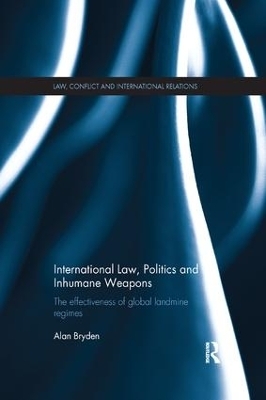
International Law, Politics and Inhumane Weapons
The Effectiveness of Global Landmine Regimes
Seiten
2017
Routledge (Verlag)
978-1-138-10939-1 (ISBN)
Routledge (Verlag)
978-1-138-10939-1 (ISBN)
This book contributes to contemporary debates on the effectiveness of international humanitarian law (IHL) in regulating or prohibiting inhumane weapons, such as landmines.
Two treaties have emerged under IHL in response to the humanitarian scourge of landmines. However, despite a considerable body of related literature, clear understandings have not been established on the effectiveness of these international legal frameworks in meeting the challenges that prompted their creation.
This book seeks to address this lacuna. An analytical framework grounded in regime theory helps move beyond the limitations in the current literature through a structured focus on principles, norms, rules, procedures, actors and issue areas. On the one hand, this clarifies how political considerations determine opportunities and constraints in designing and implementing IHL regimes. On the other, it enables us to explore how and why ‘ideal’ policy prescriptions are threatened when faced with complex challenges in post-conflict contexts.
This book will be of much interest to students of international humanitarian law, global governance, human security and IR in general.
Two treaties have emerged under IHL in response to the humanitarian scourge of landmines. However, despite a considerable body of related literature, clear understandings have not been established on the effectiveness of these international legal frameworks in meeting the challenges that prompted their creation.
This book seeks to address this lacuna. An analytical framework grounded in regime theory helps move beyond the limitations in the current literature through a structured focus on principles, norms, rules, procedures, actors and issue areas. On the one hand, this clarifies how political considerations determine opportunities and constraints in designing and implementing IHL regimes. On the other, it enables us to explore how and why ‘ideal’ policy prescriptions are threatened when faced with complex challenges in post-conflict contexts.
This book will be of much interest to students of international humanitarian law, global governance, human security and IR in general.
Alan Bryden is Deputy Head of Research, Geneva Centre for the Democratic Control of Armed Forces (DCAF), and has a Phd in International Relations from the University of Bradford, UK.
1. The Design, Implementation and Effectiveness of Global Landmine Regimes 2. Regimes Prohibiting the Use in War of Poison Gas and Dum Dum Bullets 3. The Emergence of the Landmine Regimes 4. Implementing the Landmine Regimes 5. Humanitarian Demining 6. Stockpile Destruction 7. The Effectiveness of Global Landmine Regimes
| Erscheinungsdatum | 04.07.2017 |
|---|---|
| Reihe/Serie | Law, Conflict and International Relations |
| Zusatzinfo | 4 Tables, black and white |
| Verlagsort | London |
| Sprache | englisch |
| Maße | 156 x 234 mm |
| Gewicht | 453 g |
| Themenwelt | Recht / Steuern ► Allgemeines / Lexika |
| Recht / Steuern ► EU / Internationales Recht | |
| Sozialwissenschaften ► Politik / Verwaltung ► Europäische / Internationale Politik | |
| Sozialwissenschaften ► Politik / Verwaltung ► Staat / Verwaltung | |
| ISBN-10 | 1-138-10939-8 / 1138109398 |
| ISBN-13 | 978-1-138-10939-1 / 9781138109391 |
| Zustand | Neuware |
| Haben Sie eine Frage zum Produkt? |
Mehr entdecken
aus dem Bereich
aus dem Bereich
Studienbuch
Buch | Hardcover (2023)
De Gruyter Oldenbourg (Verlag)
44,95 €
erfolgreiche Interessenvertretung durch Prozesskompetenz im komplexen …
Buch | Hardcover (2023)
Wiley-VCH (Verlag)
42,00 €


